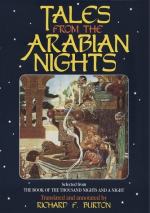Mr. Lane, during his three years’ labour of translation, first accepted Von Hammer’s view and then came round to that of De Sacy; differing, however, in minor details, especially in the native country of The Nights. Syria had been chosen because then the most familiar to Europeans: the “Wife of Bath” had made three pilgrimages to Jerusalem; but few cared to visit the barbarous and dangerous Nile-Valley. Mr. Lane, however, was an enthusiast for Egypt or rather for Cairo, the only part of it he knew; and, when he pronounces The Nights to be of purely “Arab,” that is, of Nilotic origin, his opinion is entitled to no more deference than his deriving the sub-African and negroid Fellah from Arabia, the land per excellentiam of pure and noble blood. Other authors have wandered still further afield. Some finding Mosul idioms in the Recueil, propose “Middlegates” for its birth-place and Mr. W. G. P. Palgrave boldly says “The original of this entertaining work appears to have been composed in Baghdad about the eleventh century; another less popular but very spirited version is probably of Tunisian authorship and somewhat later."[FN#166]
B.—The Date.
The next point to consider is the date of The Nights in its present form; and here opinions range between the tenth and the sixteenth centuries. Professor Galland began by placing it arbitrarily in the middle of the thirteenth. De Sacy, who abstained from detailing reasons and who, forgetting the number of editors and scribes through whose hands it must have passed, argued only from the nature of the language and the peculiarities of style, proposed le milieu du neuvieme siecle de l’hegire ( = A.D. 1445-6) as its latest date. Mr. Hole, who knew The Nights only through Galland’s version, had already advocated in his “Remarks” the close of the fifteenth century; and M. Caussin (de Perceval), upon the authority of a supposed note in Galland’s Ms.[FN#167] (vol. iii. fol. 20, verso), declares the compiler to have been living in A.D. 1548 and 1565. Mr. Lane says “Not begun earlier than the last fourth of the fifteenth century nor ended before the first fourth of the sixteenth,” i.e. soon after Egypt was conquered by Selim, Sultan of the Osmanli Turks in A.D. 1517. Lastly the learned Dr. Weil says in his far too scanty Vorwort (p. ix. 2nd Edit.):-"Das wahrscheinlichste duerfte also sein, das im 15. Jahrhundert ein Egyptier nach altern Vorbilde Erzaehlungen fuer 1001 Naechte theils erdichtete, theils nach muendlichen Sagen, oder fruehern schriftlichen Aufzeichnungen, bearbeitete, dass er aber entweder sein Werk nicht vollendete, oder dass ein Theil desselben verloren ging, so dass das Fehlende von Andern bis ins 16. Jahrhundert hinein durch neue Erzaehlungen ergaenzt wurde.”
But, as justly observed by Mr. Payne, the first step when enquiring into the original date of The Nights is to determine the nucleus of the Repertory by a comparison of the four printed texts and the dozen MSS. which have been collated by scholars.[FN#168] This process makes it evident that the tales common to all are the following thirteen:—




